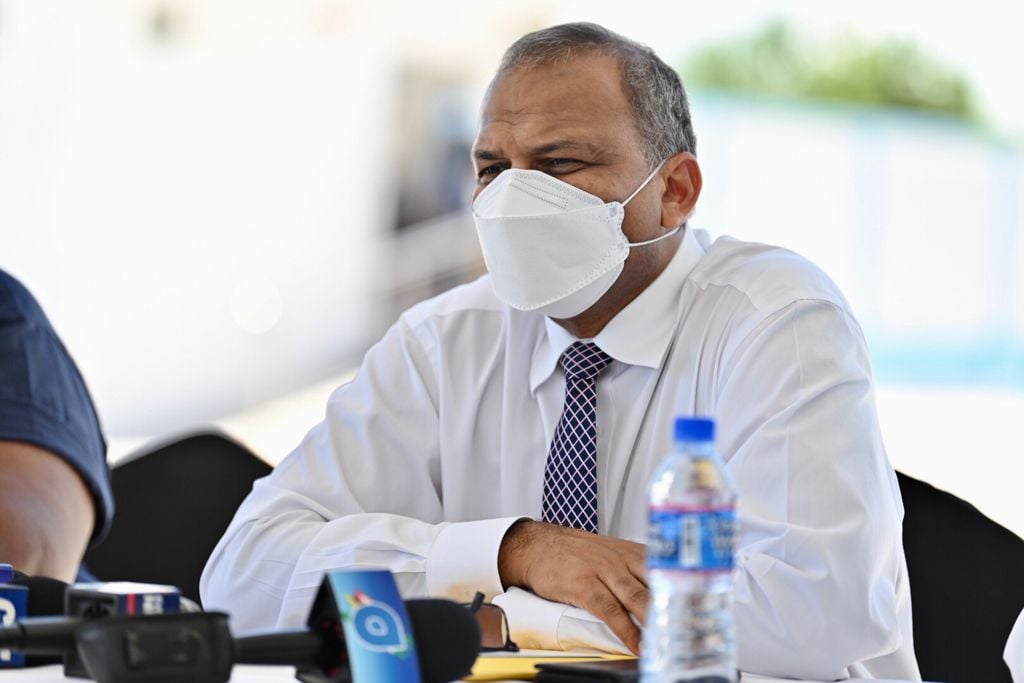
Health workers upping fight on hesitancy as thousands still unvaccinated
By Vishani Ragobeer
Thousands of Guyanese, who are eligible for the life-saving COVID-19 vaccines, have not yet taken those jabs while thousands more are yet to return for their second doses.
The Ministry of Health is now offering more training to health workers so that they can counter vaccine hesitancy – a factor that appears to deter vaccine acceptance.
“While I think there is a lot of complacency now with vaccination, we still have room for improvement,” Health Minister Dr. Frank Anthony said while addressing the opening of a vaccination workshop for health workers on Monday.
Since February 2021, when Guyana’s COVID-19 vaccination campaign began, the country has been able to administer 432,024 first doses of a COVID-19 vaccine to adults; 327,775 people have received first and second doses.
While those figures are impressive, Dr. Anthony said they also illustrate that thousands of people remain unvaccinated and therefore, without greater protection against the deadly novel coronavirus.

According to the Health Ministry’s estimates, about 80,959 adults are yet to take any dose of a COVID-19 vaccine while 185,208 adults should return for their second dose.
Aside from the adults, Dr. Anthony said thousands of teenagers – who are eligible for the Pfizer vaccine only – are yet to get vaccinated.
Figures from the Health Ministry illustrate that 33,529 teenagers (aged 12 to 17 years old) received their first Pfizer dose but 39,405 teenagers are yet to receive their first dose.
And, only 24,202 teenagers received their first and second doses with 48,843 needing to get that second dose to become fully vaccinated.

“One of the big challenges that we have is that even if older children are willing, we are not able to administer those vaccines because we need parental permission,” Dr. Anthony said.
Because of this hesitancy from parents, and hesitancy generally, the Health Ministry has embarked on the new training programme for healthcare workers.
Through this programme, healthcare workers will be edified on vaccines, their effectiveness and on strategies to counter misinformation in their communities. Altogether, this is expected to counter vaccine hesitancy and promote vaccine acceptance.
According to the World Health Organization (WHO), vaccine hesitancy refers to a delay in acceptance or refusal of vaccines despite the availability of those vaccines. Misinformation is one factor that contributes to hesitancy.
Melissa Thompson, a Medex working in the small islands found in Region Three (Essequibo Islands-West Demerara) agreed that misinformation has hindered the swift rollout of COVID-19 vaccines.

“In those hinterland areas, it’s very challenging to get information,” Thompson told the News Room on Monday, explaining that the false information people get from social media often informs their decisions to refuse vaccines.
Over the past year, she worked with regional health authorities to engage in medical outreach sessions monthly. Through these sessions, she said that she has been able to talk to people and address concerns people might have about the vaccines.
One consistent concern has been that the COVID-19 vaccines weaken your immune system because people often “get sick” when they take the jab. And so, Thompson related that she has been able to explain that those symptoms actually mean that the vaccine is working to protect the body.
Now, with this new training programme, which lasts until Wednesday, the Medex believes that she will be able to more adequately address the concerns of hundreds of residents who live on those islands.
Over in Region 10 (Upper Demerara-Berbice), the region that continues to record the lowest vaccination uptake nationally, misinformation has also hindered vaccination uptake, according to Regional Health Officer (RHO) Dr. Gregory Harris.

He explained that the local health authorities have employed various strategies to boost vaccination uptake, including medical outreach and awareness sessions and even house-to-house programmes.
Dr. Harris, however, explained that what seems to be yielding some success is engaging residents on a one-and-one basis- away from their homes and workplaces.
Since doing this, he has found that residents are more comfortable raising all of the concerns that they might have without being heckled by people around them.
And so, over the next few months, the regional health authorities will be exploiting the knowledge the healthcare workers would have garnered from the training and attempt to engage more people on that one-and-one basis to boost vaccination uptake.






